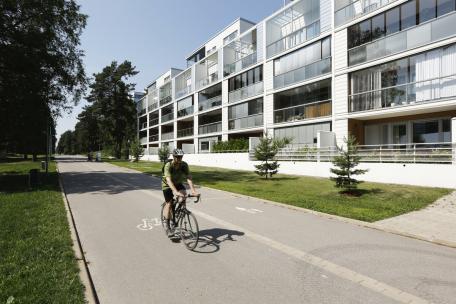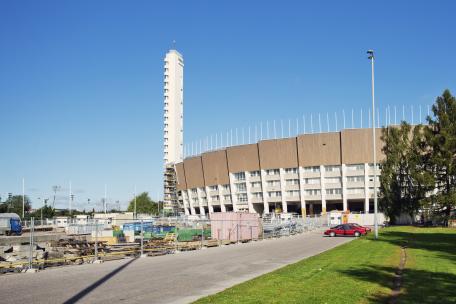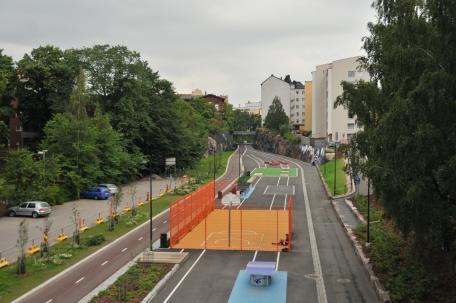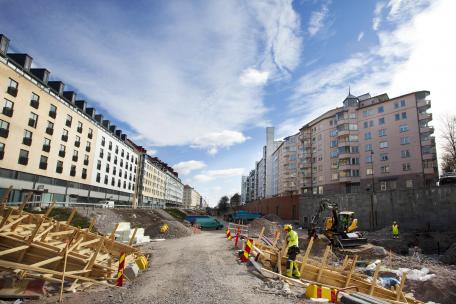Articles
Adaptation and preparedness for extreme weather events
Helsinki’s operational preparedness is at a good level, but adaptation and preparedness require changes in land use planning and construction and decisions on the level of preparedness.
Read more about adaptation and preparedness for extreme weather events ›
Social guidance for families with children
The City Strategy states that families will be supported in a multidisciplinary way, with resources directed towards early and wide-ranging support. Access to social guidance for families with children has been improved and the service has been expanded and developed. However, the waiting time for the service has increased, and the availability of skilled personnel has decreased.
Read more about social guidance for families with children ›
Meeting binding targets
The City met a higher proportion of its binding targets than before. 64 per cent of the binding operational targets and 74 per cent of their indicators in the 2024 budget were met.
Read more about the meeting of binding targets ›
Objectives set for the Group
Nearly half of the objectives set for the most notable subsidiaries were achieved, in addition to which nearly all of the objectives set for sports sector subsidiaries were achieved. However, the achievement of certain objectives is difficult to assess.
Read more about the objectives set for the Group ›
Data breach in the Education Division
The Education Division’s data breach revealed weaknesses in the City’s data security controls, data security maintenance responsibilities and data retention practices. The data breach highlighted the need to clarify the City’s data security management.
Read more about the data breach in the Education Division ›
The City’s finances
In 2024, expenditure growth exceeded the target set in the strategy. In the previous few years, the target was met. The loan portfolio has decreased, but gross liabilities have increased as a result of loan guarantees issued to Group entities in particular.
Read more about the City's finances ›
Implementation of productivity-enhancing reforms
City divisions and enterprises had started the planning and implementation of productivity-enhancing reforms in line with the City Strategy for 2021–2025. The Urban Environment Division and Helsinki City Construction Services Stara had systematically implemented measures in accordance with the productivity-enhancing action plan and achieved desired impacts.
Read more about the implementation of productivity-enhancing reforms ›
Promotion of Helen Ltd’s environmental objectives
Helen has, for the most part, promoted the Helsinki City Group's environmental objectives, but the ecological sustainability of the biomass that it burns requires further attention. Helen is investing in the promotion of small-scale nuclear power.
Read more about the promotion of Helen Ltd's environmental objectives ›
Coordination of roadworks and reduction of their negative impacts
The City has taken measures to reduce the negative impacts of roadworks, but these efforts should be continued in the future as well. For now, legislation does not support efforts to reduce the negative impacts of roadworks.
Read more about the coordination of roadworks and reduction of their negative impacts ›
Productivity of ICT service purchases in the Education Division
The ICT service purchases carried out by the Education Division cannot be considered to have resulted in cost savings. ICT service purchases have, however, successfully increased productivity to some extent.
Read more about the productivity of ICT service purchases in the Education Division ›
The City’s business services, cooperation with higher education institutions and investment attraction
The City’s rapid growth rate has caused challenges for companies with larger space needs, as the increasingly dense structure has resulted in a lack of space. Cooperation between the City and higher education institutions has been active.
Read more about the City’s business services, cooperation with higher education institutions and investment attraction ›
Accessibility of daycare facilities and realisation of pedagogical objectives
The City of Helsinki’s daycare centres can easily be reached on foot or by public transport. The daycare facilities largely provide a good learning environment, but there is a lack of quiet spaces suitable for small groups, according to users.
Read more about the accessibility of daycare facilities and the realisation of pedagogical objectives ›
Swedish-language health and social services for families with children
In most of the services assessed, Swedish-speaking client families are provided with the same or, in some services, even better service than Finnish-speaking ones. The City purchases Swedish-language services in certain individual child welfare services where it does not have any Swedish-speaking staff.
Read more about Swedish-language health and social services for families with children ›
Reducing homelessness
Helsinki is a pioneer in reducing homelessness. Housing counselling helps to avoid evictions, which have a high financial and human cost. There is still room for improvement in the safety of emergency housing services.
Read more about reducing homelessness ›
Information flow and cooperation between basic education and Child Welfare
Information exchange and cooperation between basic education and the child welfare needs assessment unit have primarily followed the City's guidelines. However, there are many guidelines and they are not clear and consistent in all respects. The consultation practices of pupil welfare and Child Welfare are effective, and staff competence has been developed.
Read more about information flow and cooperation between basic education and Child Welfare ›
Functioning of the service voucher system in primary health care
The use of the service voucher has not significantly contributed to the functioning of primary health care and smooth access to treatment at health stations, as it is only suitable for a small proportion of health station clients, and the availability of the voucher is limited. The service voucher has, however, improved access to treatment at times in certain areas and for individual clients.
Read more about the functioning of the service voucher system in primary health care ›
Access for elderly people from home care to 24-hour care
The access for elderly people in home care to long-term 24-hour care has improved and waiting times have been reduced. The application process may take a long time and client feedback is not collected on its functioning.
Read more about the access of older people in home care to 24-hour care ›
The effectiveness of recommendations
Measures have been taken on 96% of the recommendations presented in the 2022 assessment report.
Read more about the effectiveness of the recommendations of the 2022 assessment report ›
2024ManagementCityEducation DivisionHelsinki City Transport (HKL)Social Services, Health Care and Rescue Services DivisionCity Executive OfficeUrban Environment DivisionCulture and Leisure DivisionService CentreRescue DepartmentConstruction Services (Stara)Financial Management HelsinkiOccupational Health Helsinki
Meeting binding targets
Fifty-eight per cent of the binding operational targets in the 2023 budget and 60% of their indicators were met.
Read more about the achievement of binding targets ›
Targets set for the Group
Ownership strategies set objectives for the subsidiaries. However, assessing whether the objectives have been met is difficult because they are set so vaguely.
Read more about the objectives set for the Group ›
The city’s finances
2023 was the first year in which the expenditure and income of social services, health care and rescue services are no longer part of the city’s self-financed budget. Key figures show that the restructuring had little impact on the City of Helsinki’s financial situation.
Read more about the city’s finances ›
Supporting foreign-language pupils in comprehensive schools
The city’s Finnish-language comprehensive schools have supported foreign-language pupils in their learning, but some measures are incomplete or limited in scope. Language support varies between schools because of differences in resources and skills in providing support.
Read more about supporting foreign-language pupils in comprehensive schools ›
Achieving the Carbon Neutral Port objective
The Port of Helsinki’s emissions reduction target for ship emissions will almost certainly be reached in 2030. Emissions from heavy goods vehicles and machinery have not yet fallen significantly.
Read more about progress towards the Port’s carbon-neutrality target ›
Attractiveness of libraries and promoting reading
Visitors have found their way back to libraries in 2023 following the coronavirus pandemic, as the number of library visits has increased compared to 2020–2022. Library visits by primary school pupils are extensive, but lower secondary and secondary school pupils and students visit less.
Read more about the attractiveness of libraries and promoting literacy ›
Development of cultural grants
Cultural grants have been partly developed in line with the City Strategy and the Culture Unit’s service strategy, but it has been impossible to monitor the inclusion of new operators or art forms within the scope of support.
Read more about the development of cultural grants ›
Strengthening youth work
During the coronavirus pandemic, detached work became part of basic youth work. However, the resources of youth work units are insufficient to cope with the increased tasks and needs. Recruiting staff has become more difficult.
Read more about the strengthening youth work assessment ›
The progress of urban renewal
Urban renewal is only just beginning, and so far relatively minor measures have been taken in the areas. However, efforts have been made to promote the objectives of urban renewal.
Read more about the progress of urban renewal ›
The Social Services, Health Care and Rescue Services Division’s preparedness for incidents and emergencies
The Social Services, Health Care, and Rescue Services Division’s preparations for incidents and emergencies are mainly appropriate, but based on the findings, development work should continue in the future.
Read more about the Social Services, Health Care and Rescue Services Division’s preparedness for incidents and emergencies ›
Winter maintenance of pedestrian and bicycle paths
The city has not been able to increase the proportion of people satisfied with winter cycling. Measures to improve winter conditions on pedestrian paths are only just beginning. Taking winter maintenance into account in land-use planning solutions would allow for more effective snow management.
Read more about the winter maintenance of pedestrian and bicycle paths ›
Preventing drug-related deaths in substance abuse services
The city’s substance abuse services have facilitated access to treatment for people with drug dependencies through many reforms that have improved access to opioid substitution and detoxification treatment. The impact of the reforms on access to other substance abuse services could not be assessed because the reforms have only been in place for a very brief period and comparable statistical data were not available. Services for people suffering from drug dependence can also reduce the harm caused by drug use and improve the amenity and safety of the surrounding area, but facilities are lacking.
Read more about the prevention of drug-related deaths in substance abuse services ›
City advocacy from an economic perspective
The city’s national advocacy has developed with the mayor model over the last two strategic periods.
Read more about the city’s advocacy ›
The effectiveness of recommendations
Action has been taken on 94% of the recommendations from the 2021 assessment report.
Read more about the effectiveness of the recommendations of the 2021 assessment ›
Achievement of binding targets
Forty-two per cent of the binding operational targets were met. Fifty-eight per cent of the indicators measuring target achievement were met. The coronavirus pandemic still affected meeting targets, especially in the Culture and Leisure Division.
Read more about the achievement of binding targets in 2022. ›
The implementation of Sarastia, the human resources and payroll system
The introduction of Sarastia, the human resources and payroll system, failed in several areas. There were shortcomings in management, operational models, competence and system performance. Not enough effort was put into deployment and, in particular, into change management.
Read more about Sarastia’s implementation ›
Targets set for the Group
As of the 2022 budget, the City Council has no longer set targets for the City Group’s subsidiaries. In practice, the decision-making power for setting goals has been delegated to the City Board in the Group Guidelines adopted on 1 March 2023. The Audit Committee believes that the most significant subsidiaries at least should have goals to report to the City Council.
Read more about setting targets for the Group ›
The city’s finances
The city’s finances were on a solid footing despite a slight increase in the loan portfolio. The transition of Social Services, Health Care and Rescue Services to government funding from 2023 onwards will significantly change the funding base.
Read more about finances ›
Efficient use of building assets
The city has developed its building asset management and disposal processes and ownership policies, but these do not yet fully support strategic objectives and service needs. The disposal process for premises has recently been developed, so it remains to be seen what its effects will be.
Read more about the use of building assets ›
Employee well-being, retention and attraction in senior centres
Senior centres have made efforts to improve employee well-being, retention and attraction, but the indicators show that there is still room for improvement in future.
Read more about employee well-being, retention and attraction in early childhood education and care ›
Employee well-being, retention and attraction in early childhood education and care
According to the city strategy, the city must improve working conditions and staff availability in early childhood education and care. The Education Division has taken many measures, but staff well-being, retention and attraction have deteriorated due to severe staff shortages.
Read more about staff well-being, retention and attraction in early childhood education and care ›
Promoting the well-being of upper secondary school students
The Education Division has taken many steps to improve student well-being and increase their sense of community. However, the services of student welfare psychologists are not easily accessible, and there is a waiting list for further treatment.
Read more about promoting the well-being of upper secondary school students ›
Access to early-stage mental health services for adults
The city has worked to improve adults’ access to early-stage mental health services, e.g. by training staff and opening more Mieppi low-threshold mental health units. The impact of the new tools introduced through training has yet to translate into faster access to care for clients.
Read more about access to early-stage mental health services for adults ›
Maternity and child health services to support families with children
Maternity and child health services aim to meet the individual needs of families. However, families do not always receive specialised support quickly enough, and there is room for improvement in the continuity of care.
Read more about maternity and child health services ›
Services in Family and Social Services to support the well-being of informal carers
Temporary care for people under 65 during informal care leave does not always meet the needs of different client groups. There are not enough temporary care placements for all client groups.
Read more about the services to support the well-being of informal carers ›
The impact of residential planning on green spaces
Residential planning has sought to preserve green spaces and valuable nature sites. However, green spaces have been designated for housing, as land-use planning also pursues its objectives for housing production.
Read more about the impact of residential planning on green spaces ›
Resident participation in land-use planning
The opportunities for residents to participate in land-use planning are broader than the legislation requires. Less active groups are activated if necessary.
Read more about resident participation in land-use planning ›
Safety in the city’s various areas
The number of crimes committed by young people has remained relatively stable in recent years. However, serious criminal offences against persons committed by young people are on the rise. On the other hand, there has been a marked decline in police alerts for disorderly behaviour and vandalism.
Read more about safety in the city’s various areas ›
Promoting sustainable transport modes
The percentage of sustainable forms of transport has not increased. Promoting walking is very much in its initial stages and operates with limited resources.
Read more about promoting sustainable transport modes ›
Streamlining driving, walking and logistics in Helsinki’s city centre
As set out in its city strategy and various programmes, the city has taken many measures to streamline walking, driving and logistics. However, significant impacts have yet to be seen.
Read more about streamlining driving, walking and logistics in Helsinki’s city centre ›
The effectiveness of recommendations
Action has been taken on 90% of the recommendations from the 2020 assessment report.
Read more about the effectiveness of the 2020 assessment report’s recommendations ›
Effectiveness of recommendations
The recommendations the Audit Committee issued in 2019 usually led to measures.
Read more about the effectiveness of the recommendations of the 2019 assessment report. ›
Achievement of binding objectives
51 per cent of the binding operation objectives were achieved. The prolongation of the COVID-19 pandemic has impacted the achievement of the objectives of the Education Division and the Social Services and Health Care Division in particular.
Read more about the achievement of the 2021 binding objectives ›
City economy
The economy of the city still has a sound foundation, even though the increasing operating costs have exceeded the limits determined by the City Strategy. The city has succeeded in reducing the loan portfolio in accordance with the strategy while the investment costs have been high. The social welfare and health care reform in 2023 will change the financing base considerably.
Read more about the economy ›
Remedying the loss of learning caused by distance education in secondary schools
Secondary schools have increased the support available in order to remedy the loss of learning caused by distance education; however, allocating the support in the future requires reliable data.
Read more about remedying the loss of learning caused by distance education in secondary schoolsyläkouluissa ›
Adequacy of student counselling in vocational education
Student counselling and the rate of studies completion have been developed in a diverse manner, but based on the survey of the personnel, there is not enough counselling available to students.
Read more about student counselling in vocational education. ›
Adequacy of open child welfare services
The number of employees in the services of open child welfare is at its statutory level, but due to the increased challenges families face, all needs cannot always be addressed. Furthermore, child welfare has open vacancies for social workers, but the vacancies remain uncovered.
Read more about the adequacy of open child welfare ›
Home care for elderly citizens
Efforts have been made to develop home care in the last few years, but most of the objectives have not been achieved. Home care’s most prominent issue is the shortage of personnel. Linguistic equality is not realised due to the lack of Swedish-speaking nursing personnel.
Read more about the adequacy of home care ›
Elderly patients in emergency services
Home care and service housing have introduced a guidebook for emergency situations and the mobile nurse service, but they are not utilised to their full potential. Closer cooperation should be established when discharging patients from hospital.
Read more about emergency services for elderly citizens ›
Mental health rehabilitees’ path from hospital care to housing
The city has strived to promote mental health rehabilitees’ access to housing services by turning the Aurora Hospital’s wards of rehabilitative psychiatry into housing units and by increasing the service selection of housing services in the competitive tendering of purchased services. However, the number of people on the waiting list for housing services has not decreased.
Read more about the housing path of mental health rehabilitees ›
Implementation of the Physical Activity Programme goals
The actions of the Physical Activity Programme of Helsinki have largely been implemented. The majority of the three target areas’ actions have been either implemented or advanced on schedule.
Read more about the implementation of the actions of the Physical Activity Programme ›
Promotion of biodiversity in forestry
The natural value of the city’s forests have increased in the long term, thanks to the nature management and planned exclusions from the management. The key actions promoting biodiversity were allowing forests to have moulder wood, favouring trees of different species and ages, and excluding sites recognised as important for biodiversity from the nature management.
Read more about promoting biodiversity in forestry ›
Favourable attitude towards companies and cooperation with companies
The measures promoting a friendly attitude towards companies, for which the Economic Development Division of the City Executive Office was responsible, have largely been successful. In the future, the development of corporate cooperation and a favourable attitude towards companies will require contributions from the entire city organisation and the Economic Development Division in particular.
Read more about the favourable attitude towards companies and cooperation with companies ›
City’s digital security
The city has prepared for digital security risks, but the level of preparedness should still be increased. For instance, the organisation of digital security still needs improvement.
Read more about the city’s digital security ›
Realisation of tenant democracy within Helsingin kaupungin asunnot Oy
At Heka, residents do not have authority in all the matters required by the Act on Joint Management of Rental Buildings. On the other hand, Heka’s tenant democracy has elements not required by the legislation. The activists for residents’ rights are unsatisfied with the actual influencing opportunities the residents have.
Read more about the realisation of Heka’s tenant democracy ›
Effectiveness of the recommendations
Most of the recommendations issued by the Audit Committee in 2018 led to actions.
Read more about the realisation of the recommendations ›
Follow-up on the recommendations of the financial audit
The auditor has repeatedly issued recommendations on the following topics: memo vouchers, balance sheet breakdowns, the tracking of movable assets and the existence of assets, procurement activities and administration.
Read more about the follow-up on the recommendations of the financial audit ›
Achievement of binding objectives and targets
56 per cent of the binding operational objectives and targets were achieved. The binding operational objectives and targets were best achieved in the Central Administration and the Urban Environment Division.
Read more about the achievement of binding operational objectives and targets ›
The City’s finances
It has been possible to reduce borrowing despite large investments. The increase in expenditure has exceeded the target of the City Strategy. The COVID-19 pandemic is causing economic uncertainty.
Read more about finances ›
Modernisation and refurbishment project of the Olympic Stadium
The costs of the Olympic Stadium modernisation and refurbishment project were almost EUR 127 million higher than estimated in the project plan. Additional and alteration work increased the costs the most. Another reason for the cost overrun is the fact that the costs of the project plan were not tied to the tender price index.
Read more about the Olympic Stadium refurbishment project ›
Preventing segregation of residential areas
Areal segregation has not decreased, although Helsinki has been able to curb segregation through a long-term housing policy aimed at creating a diverse population and housing structure.
Read more about preventing segregation of residential areas ›
Impacts of the appropriation for positive discrimination (PD) in comprehensive schools
In line with its objective, the funding for positive discrimination (PD) has compensated for area-based differences in well-being in comprehensive schools caused by the urban structure. The appropriation is considered to be important and its criteria oriented in the right direction.
Read more about the assessment of the PD appropriations ›
Project for Youth Social Inclusion and Me school development to prevent social exclusion in comprehensive schools
Good experiences have been gained with the measures taken to reduce inequalities between children and young people and prevent their social exclusion, but the permanence of the effects is uncertain.
Read more about the measures to prevent social exclusion among children and young people ›
Substance abuse services
The Social Services and Health Care Division has developed the treatment of people with substance abuse problems and harm reduction services and lowered the threshold for access to services. Cooperation with other operators, particularly child welfare services, needs to be developed.
Read more about the assessment of substance abuse services ›
Sufficiency of Child Welfare foster care
Child Welfare is having challenges in meeting the increased need for foster care with family care and special and demanding institutional care.
Read more about Child Welfare foster care ›
Promoting gender equality in the Culture and Leisure Division
Gender equality is taken into account in the different services of the Culture and Leisure Division, but the way in which information on service users’ gender is collected varies.
Read more about the promotion of gender equality ›
Access to non-urgent care at health stations
Access to non-urgent care is provided at health stations mainly within the time limits prescribed by law, but not in accordance with Helsinki’s own objectives or in an equal manner.
Read more about access to non-urgent care ›
Communal student welfare in basic education
Preventive communal student welfare has been promoted in accordance with the Student Welfare Act, but the pupils’ right to receive psychologist and welfare officer services in student welfare was not realised within the statutory deadline.
Read more about the assessment of communal student welfare ›
Realisation of participatory budgeting in the Urban Environment Division
The implementation of the Urban Environment Division’s participatory budgeting projects has been successful, despite limited human resources and a tight schedule. However, communication about the progress of the projects and the involvement of residents in the implementation of the projects reached only a small group of residents.
Read more about the assessment of participatory budgeting ›
Realisation of young people’s opportunities to influence
Young people’s influence and participation can best be supported at school. This requires closer cooperation between the Education Division and the Culture and Leisure Division.
Read more about the assessment of young people’s opportunities to influence ›
Reducing emissions from construction and building use
The Urban Environment Division and Helsinki City Housing Company have taken numerous measures to reduce emissions. In order for the objectives of the Carbon-neutral Helsinki 2035 action plan to be achieved on schedule, a considerable number of energy refurbishments of private housing companies will be required.
Read more about the measures to reduce emissions from construction and building use ›
Achievement of environmental policy objectives in procurement
The environmental policy objectives set by the City Council in 2012 have not been fully achieved in the City of Helsinki’s procurement. Although environmental criteria have been set in several procurements with significant environmental impact in the past, more extensive development has only begun in recent years with the Carbon-neutral Helsinki 2035 action plan.
Read more about the achievement of environmental policy objectives in procurement ›
Maritime Helsinki
The objectives of the City Strategy have been furthered during this council period of office. Half of the measures planned for the early years of the Maritime Strategy have already been implemented either fully or for the most part.
Read more about the assessment of maritime Helsinki ›
Corporate governance of business premises companies
Corporate governance of business premises companies has for the most part been organised appropriately. However, the assessment found needs for supplementing the corporate governance principles.
Read more about the corporate governance of business premises companies ›
Direction provided to the City divisions by the City Executive Office, mayor and deputy mayors
With the introduction of the new management system and City division model, the controllability of the City organisation has improved. However, control and direction have become more fragmented, and there is a lack of clarity regarding who directs what.
Read more about assessment of the new management system ›
Effectiveness of the recommendations
The recommendations issued by the Audit Committee in 2017 led to measures except the fact that the dual role of elected representatives and office holders who belong to the Helsinki Group’s administration continues to be problematic.
Read more about Effectiveness of the recommendations
›
Achievement of the binding objectives and targets
The City divisions that were the most successful in achieving their binding operational objectives and targets were the Education Division and Central Administration.
Read more about Achievement of the binding objectives and targets
›
The City’s finances
The City’s finances were strong in 2019. The coronavirus pandemic will weaken the City’s finances in 2020.
Read more about The City’s finances
›
Impacts of enhancing the use of space
The results obtained on enhancing the use of space and changing the measures used for this purpose have varied in different services of the City. However, taking the views of customers and staff into account has been found to be important in facility alterations.
Read more about Impacts of enhancing the use of space
›
Ownership steering of sports and cultural services and overall management
The ownership steering of sports and cultural services is organised in an appropriate manner for the most part. At City level, the problem is that the division of labour between the mayor and deputy mayors has not been defined.
Read more about assessment of sports and cultural services ›
Achievement of the objectives of early childhood education and care
The objectives set for early childhood education and care (ECEC) in the City Strategy were achieved for the most part, but the staff shortage may undermine the achievement of the objectives in the future.
Read more about Achievement of the objectives of early childhood education and care
›
Integration of families with children in the Education Division
The integration of families with children has been promoted in the Education Division, but the division must increase the development of the skills of its own staff with regard to integration.
Read more about Integration of families with children in the Education Division
›
Realisation of the accessibility policies
The accessibility of the built environment was actively promoted in the 2010s, but there is still a need to increase cooperation with disability associations. The realisation of the accessibility of the built environment according to plan should be ensured.
Read more about Realisation of the accessibility policies
›
Quality of digital services
The quality of the City of Helsinki’s digital services is good for the most part when compared to the national quality criteria for digital services. However, there is room for development in the findability and functionality of the services.
Read more about Quality of digital services
›
Electronic health care services
The electronic health care services are high quality, but not all residents of the municipality are able to use them. Because of this, the availability of traditional service channels must also be ensured in the future.
Read more about Electronic health care services
›
Realisation of digitalisation in basic education
Basic education currently has sufficient and functional digital environments, systems and equipment, but they must be developed and replaced. The digital and pedagogical skills of teachers have not improved as planned, and there is a lack of sufficient monitoring data on the development of pupils’ skills.
Read more about Realisation of digitalisation in basic education
›
Quality control of 24-hour care of the elderly
The quality control of the 24-hour care of the elderly can be considered to be satisfactory in the City’s own service provision and sufficient in purchased services.
Read more about Quality control of 24-hour care of the elderly
›
Availability and productivity of oral health care services
The oral health care services of the City of Helsinki are high quality, but access to care has been difficult, particularly due to problems in making contact and the lack of non-urgent appointments.
Read more about Availability and productivity of oral health care services
›
Cooperation and multi-professionality at family centres
The family centre model has increased cooperation between different professionals according to the objectives. Family centre work is just beginning in several areas of Helsinki, and there are still needs for development.
Read more about Cooperation and multi-professionality at family centres
›
Implementation of large-scale traffic projects
Not all large-scale traffic projects of the City have been implemented in such a way that it would be possible for them to stay within the original cost estimate or schedule.
Read more about Implementation of large-scale traffic projects
›
Managing disturbances caused by street construction sites
The City is unable to monitor the great number of worksites to a sufficient degree or intervene in operations efficiently enough in the event of issues. Disturbances caused by street construction sites are assessed by major professional construction operators, but they are only responsible for roughly half of the excavation sites within the city.
Read more about Managing disturbances caused by street construction sites
›
























































































